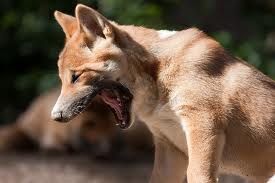{[[' ']]}
']]}
The New Guinea Singing Dogs are a rare breed of dog. It is ecologically and genetically different from other canine species and there are only about 150-200 of these captive dogs that live in zoos and as pets around the world. In the 1970’s, their breed was suspected to have been extinct because there had been no known sightings in New Guinea and other parts of the world.
Aside from their distinct singing capabilities, these canines are also known to fold their legs like the cats and as a sign of affection, they give out cheek rubs. They have the ability to spread their legs sideways as wide as 90 degrees and have the innate skill of rotating their front and hind paws which enable them to climb trees.
Short legged and broad-headed, the New Guinea Singing Dogs have an average shoulder height of 13-16 inches and reasonably weighe 17-25 pounds. The New Guinea Singing Dog also called New Guinea Dingo, Hallstrom Dog, Bush Dingo, New Guinea Wild Dog and Singer are named after their unique form of vocalization. It was during the 1950’s that the first pair of New Guinea Singing Dog (NGSD) was, brought from New Guinea and was introduced to have exceptional vocal chords that produce a pleasant sound that is distinctive and melodious.
Although quite similar to Australian Dingos, coyotes and grey wolves that are known for their howling prowess, the New Guinea Singing Dogs rare vocalization is exceptional and is characterized by an increasing pitch at the start and ends with very high frequencies somewhere at the end.
One howl alone usually lasts about 3 seconds but could easily reach up to 5 seconds and even longer. The frequency of the howl increases as it progresses, then stabilizes for the duration of the howling then it normally displays sudden changes in the frequency which cannot be predicted. At the same time, the modulations can usually change instantaneously every 300-5—milliseconds or every second.
Just like the other breed of howling canines, the New Guinea Singing Dogs howl together in group usually referred to as chorus howling. Chorus howling in most cases are synchronized very well with one dog starting to howl first and immediately followed by others’ howling. It is during morning and evening spontaneous howling is usually produced.
New Guinea Singing Dog Video















Post a Comment